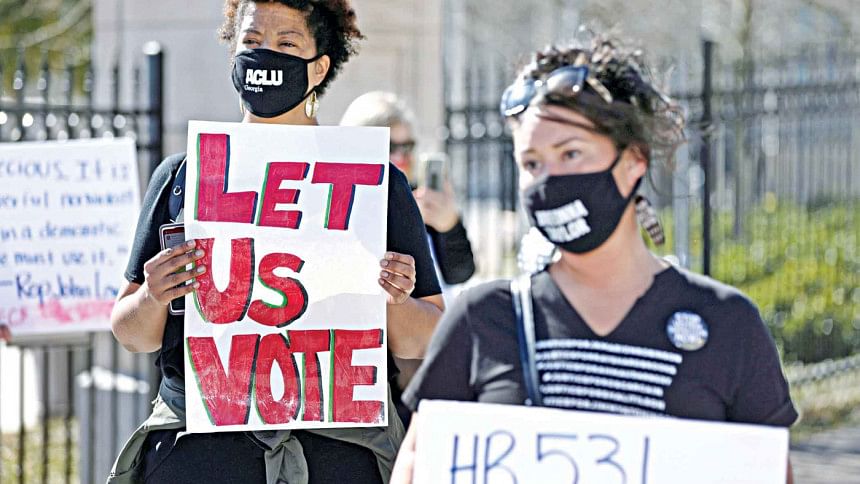A US battle between democracy and the fear of it

Hello from Georgia, ground zero in a massive US political battle.
Here I am in Atlanta, still smarting from a disconcerting national media glare since the recent kerfuffle about a new voting law passed by the Republican-controlled Georgia legislature. The force of the backlash and the counter-backlash is enough to give you vertigo.
It wasn't that long ago when Georgia was considered a dependably Republican sleepy Southern backwater. US President Joe Biden's victory in Georgia in the presidential elections last year and a shocking Democratic sweep of run-off elections this January have made Republicans sit up and take notice.
Biden was the first Democrat to win Georgia in 28 years, and Sen. Jon Ossoff and Sen. Raphael Warnock's victories in January were a stunning reversal for Republicans, who had expressly designed the run-off system to ensure a lopsided partisan advantage.
So recently, Republican legislators in Georgia passed voting legislation. Critics say it curbs voting rights, and all hell broke loose.
Biden compared the law to those of the so-called "Jim Crow" era of egregious racist laws. Atlanta-based corporate heavyweights Delta and Coca-Cola expressed displeasure. Major League Baseball cancelled a scheduled fixture from Georgia, causing serious economic pain.
In response, Republican Gov. Brian Kemp made a frenzied round around conservative media launching blistering attacks on "woke" corporations and liberal "cancel culture."
So, what's really going on?
Some critics may have indulged in hyperbole—it's not really Jim Crow, as Biden says, but more like Jim Crow Lite. Having said that, the Republicans have an extremely serious charge to answer.
While we can go down into the weeds in an abstruse debate over the merits of the bill, the most curious thing about the law is that it is essentially a solution in search of a problem.
Despite a global pandemic and record turnout, the elections last year in Georgia were a spectacular triumph. This is according to—get this—the same Republican state administration itself that now touts this law. So why this elaborate attempt to reform the voting system after such a great election?
Part of the reason is that the rabid base of the Republican Party, egged on by former President Donald Trump, believes Biden won a "stolen" election.
To this day, Trump's vicious lies about a stolen election—summarily thrown out of US courts—have created a toxic climate with potentially devastating implications. Polls show a staggering number of Republican rank and file do not recognise the legitimacy of the duly elected president of the US.
During a recent meeting with Republican donors, Trump was at it again as he lashed out at the Georgia governor for not doing enough to get him his due "win" in Georgia in 2020. The Republican base is in la-la land in significant part, thanks to right-wing media like Fox News and Newsmax. Both face billion-dollar lawsuits for spreading the canard of "stolen" elections and crooked voting machines.
Of course, there's far more to it than that. As the demographics of the US change, the Republican Party's bet on becoming a white grievance party faces an increasingly steeper democratic challenge.
So what to do? There are two obvious ways out of it. One is to woo the constituencies that represent a growing demographic—young people, people of colour, women. The Republican Party's own post-mortem after its candidate Mitt Romney lost to former US President Barack Obama in 2012 made exactly that recommendation.
Then came Trump. He gleefully took the party in a completely opposite direction.
Consequently, Republicans are embracing the less salubrious (and perhaps riskier) option. Threatened by the growing power of Democrat-leaning constituencies, the Republican strategy is as brazen as it is novel: If the voters don't choose us, then by God we will choose the voters.
They are devising ways of putting up hurdles to cut down voting of unfriendly constituencies—an enormously odd thing for a nation which considers itself a champion of democracy. Their excuse is a threadbare fig leaf: the phantom of "voter fraud," which is rather like the Loch Ness Monster. Many may profess belief in it, but nobody can actually find it. Most election experts dismiss it as a partisan bogeyman.
This is what a slew of measures proposed by Republican-controlled states aim to do. Under the rubric of voter security, pretty much all these measures end up making it difficult for constituencies that—surprise!—traditionally vote Democratic, like people of colour and poor people. The Brennan Center for Justice, a liberal-leaning law and justice institute at New York University, counts 253 bills in 43 states that seek to tighten voting rules.
The decennial US census has added another arrow in the Republican quiver. Every 10 years, based on new census data, states get to redistrict their constituencies. With a majority of states under Republican control, expect Republicans to carve up constituencies into bizarre-shaped districts to maximise partisan advantage.
Experts say if Republicans have their way, Democrats will lose the House come 2022 even with current voting trends. Democrats are fighting back with a proposed federal law that mandates more inclusive voting practices.
Republicans will tell you that this is all leftist propaganda, that all they are doing is securing the vote. It was only Trump who blurted out the truth last year in May about the Republican fear of an expanded franchise when he dismissed a Democratic-led push for reforms such as vote-by-mail, same-day registration and early voting.
"The things they had in there were crazy. They had things, levels of voting that if you'd ever agreed to it, you'd never have a Republican elected in this country again," Trump said during an appearance on Fox & Friends.
So, who will win, democracy or the Republican fear of it? Stay tuned.
Ashfaque Swapan, an Atlanta-based writer and editor, is contributing editor for Siliconeer, an online South Asian publication.

 For all latest news, follow The Daily Star's Google News channel.
For all latest news, follow The Daily Star's Google News channel. 



Comments